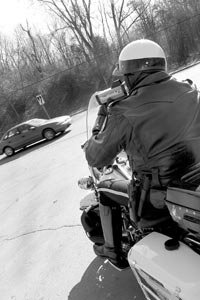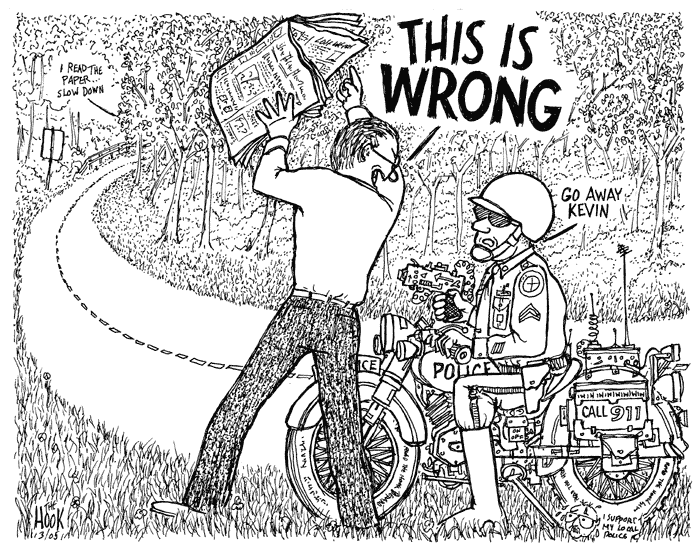>> Back to The HooK front page
NEWS- Speed trap: Don't say you weren't warned
Published March 24, 2005, in issue 0421 of The Hook
BY LISA PROVENCE
The Charlottesville Police Department can't catch a break these days.
They get low marks on a recent survey tracking compliance with the state's Freedom of Information Act, and when they do publish information-- radar locations for the week-- the department catches flak about that, too.
Pedestrian activist Kevin Cox thinks it's a bad idea to publicize radar locations.
"It sends a strange message that the police just don't want to give you a ticket," he says. "I think the message should be that police want you to obey the law."
That's the point, argues Sergeant Mike Farruggio, who sees advertising radar locations as an effective tool. "For one, it's a force multiplier," he says. "If people believe you're writing tickets on one street, they slow down" and officers can move to another spot.
"You're being seriously ignorant if you think we're only at the [published] radar locations," he cautions.
And, he says sending the radar locations to the daily newspaper and to radio station WINA is good PR. "It shows the public the traffic unit is here and working on the issue," says Farruggio. "Traffic complaints are by far the area's largest concern."
Cox wants police to send a message through "significant financial penalties" by writing lots of speeding tickets. "Those who scoff will have to pay higher insurance. I want to change behavior."
So does Farruggio. He, too, believes writing tickets slows people down and modifies behavior.
Cox has another gripe. He objects to the language of the radar alert that says speed limits will be "strictly enforced."
"Does that mean at other locations it's not being strictly enforced?" he asks.
"If you're speeding in this area, you're going to get a ticket," declares Farruggio. The three motorcycle officers who are dedicated to writing tickets are extremely efficient because of their ability to hide and turn around quickly-- and they're more likely to show zero tolerance as far as speeding.
"In other areas, officers have more discretion," says Farruggio. Patrol cars can also run radar, especially if there are complaints from the neighborhoods in which they work.
Locust Avenue resident Ashley Morse thinks publicizing radar locations raises awareness and decreases the likelihood of chain reactions from people slamming on their brakes when they spot a police officer. "It can be more dangerous when you don't know the cops are there," she says.
"I always thought it was just a reminder to people that they're out there," says Jane Foy, co-host of the WINA morning talk show, which often announces the radar locations. "It's also a response to neighborhood complaints about speeders," she says.
Albemarle, however, adopts a different philosophy toward the publicity of speed traps.
"First of all, they're not speed traps," says Albemarle Lieutenant John Teixeira. "And we do let you know-- when you see the red lights behind you."
According to Teixeira, county police get about a dozen requests a month for speed limit enforcement. The first response is to pull out the "SMART" machine that flashes how fast motorists are going. If a certain percentage is speeding, then the radar comes next.
Last year, Albemarle had approximately 10 times more people killed in car accidents than in homicides. And that doesn't include fatalities on Interstate 64, says Teixeira.
The reason officers are out there giving tickets is to save lives, he says. And without being asked, he answers, "No, we don't have quotas, and we're not in this for the revenue enhancement."
Teixeira says that in a county nearly the size of Rhode Island, it isn't practical to publicize radar locations. And he declines to identify where radar will be in Albemarle next week.
Citizens traditionally take it upon themselves to get the word out, turning into headlight-flashing Paul Reveres to warn fellow motorists when The Man is up ahead waiting to ensnare speeders.
"Police aren't enamored with it," says Teixeira about the age-old practice.
And Farruggio warns that tickets could be written for using bright lights illegally.
Radio station 3WV takes the warning practice a step further. Listeners call in to Max and Rick's Big Greasy Breakfast morning show to tip drivers off to radar locations. Substitute DJ John Spangler calls that a public service. "When people are out and about, they need to know where the speed traps are," he says.
Broadcasting the locations slows people down, says Spangler, echoing Farruggio's point. "Even if the cops have moved on, people will slow down at that location."
And that morning's report: "We got one call there's a cop shooting radar on 64 near one of the exits."
That's not likely to satisfy Kevin Cox, who still believes it takes speeding tickets to slow down speeders. And he knows first hand: "I got three tickets in a row 20 years ago before I modified my behavior and slowed down."

Even if you aren't speeding, the sight of a police car with radar causes sheer terror in passing motorists.
PHOTO BY LAUREN BROOKS

#
>> Back to The HooK front page
|